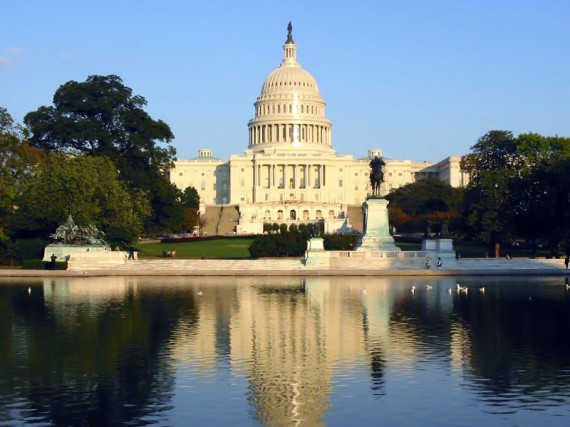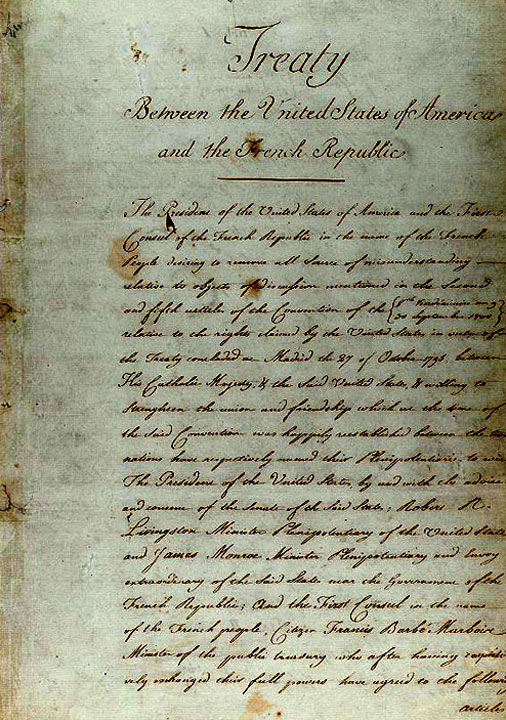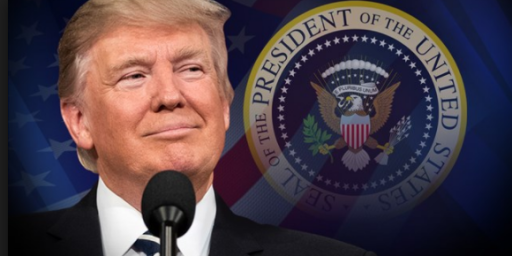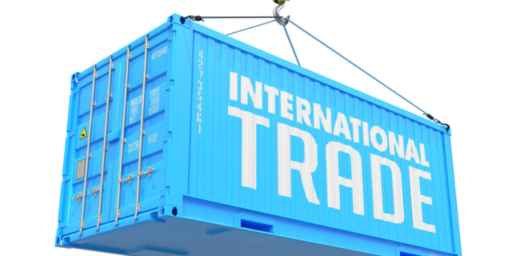Obama Administration Being Dishonest About Status Of Free Trade Agreements
Nearly every time the President has spoken about the economy since the start of the summer, one of the topics that he’s brought up consistently has been a series of free trade agreements that, at least to listen to him, have been negotiated and are merely awaiting Congressional approval. As it turns out, it’s not quite that simple and that the agreements are tied up by the same ridiculous partisan sniping that has made even the simplest acts of governing nearly impossible:
For weeks, President Obama has derided Congress for failing to pass the agreements, as well as a measure that would provide money to assist workers displaced by foreign competition. “The only thing preventing us from passing these bills is the refusal by some in Congress to put country ahead of party,” he said at a recent news conference.
Senior Republicans in Congress have howled in protest, pointing out that the agreements have not left the president’s desk to journey to the Hill for a vote.
“We have made abundantly clear publicly and privately that the House is prepared to vote on all three trade agreements,” said Kevin Smith, a spokesman for Speaker John A. Boehner, adding that the same goes for the bill to provide money to assist workers. “The only thing holding us up is the fact those trade bills are still sitting on the president’s desk.”
That Congressional Republicans and the president cannot even agree on the status of these critical trade agreements reflects just how toxic and divisive their relationship is, anchored largely in fiscal policy disagreements. The two sides have fought endlessly over the last year about the complexion of the bills and how and when they will be brought to the floors of each chamber.
The three free-trade agreements, which originated with the Bush administration, would eliminate tariffs on cross-border transactions, expanding exports of American goods by about $12 billion a year, according to estimates by the United States International Trade Commission. Under the agreements, American service providers would be able to compete in the three countries, ostensibly adding new jobs to the American economy. Because of this, they are widely supported by the U.S. Chamber of Commerce and other business trade groups.
When the Democrats controlled Congress, they resisted the trade agreements because they feared they would harm American workers. Then came the Obama administration, which insisted, as part of any trade deal, on renewing a program to assist people adversely affected and adding $964 million to the effort. That linkage has met resistance from Republicans.
In July, Senator Orrin Hatch, the ranking Republican on the Finance Committee, said that program was a deal breaker for his party. “We made it clear time and time and time again that we would not stomach attaching a big government spending program onto these agreements,” Mr. Hatch said at the time.
Since then, enough Senate Republicans have said they would sign off on a slimmed-down version of the assistance money, but Republicans in the House have been less committal. Though Mr. Boehner has agreed to bring the trade bills to the House floor, as well as a bill that would provide the assistance money, he has not explicitly said that the aid-money bill, like the trade bills, would not be tinkered with, or that it enjoys enough support from his members for passage.
Bottom line: Mr. Obama is not technically correct when he says that Congress is fully able to vote on the bills, as his administration has not sent them there in the first place. But the reason it has not done so is because it does not feel confident that House Republicans will allow their key request — the bill for worker assistance — to come to the floor unadorned with watering-down amendments, or that it would pass at all. Indeed, Senator Mitch McConnell, the minority leader, opposes the program.
Of course, the Obama Administration could send the trade bills to Congress without the “assistance programs’ — most of which are just pork designed to placate anti-free trade unionists in the Democratic coalition if they really wanted to. The economic benefits of free trade are well-established, and the President has a point that passing these agreements would help stimulate economic growth. The reality, of course, is that the economic benefits of free trade would be several years in the making at best so his attempt to tie these agreements — and the union pork hidden in them which he conveniently never mentions — to the current state of the economy is disingenuoius at best.
If the President wants Congress to pass the free trade agreements like he claims, then he needs to send them to Congress, and he needs to strip out the union pork before he does it. Free trade doesn’t need to be “off set” by more government spending. This is one time when I completely agree with the House GOP holding the line.







They won’t send them to congress because the congressional GOP has promised to block them. I don’t think one can say that the Prez is being dishonest about why they’re stalled. Saying that congress is blocking them seems accurate.
“Squirrel!”
“The economic benefits of free trade are well-established, and the President has a point that passing these agreements would help stimulate economic growth. ”
Doug, you should know better than this. Free trade agreements are Pareto-optimal only in a very loose sense of the term. They create winners and losers in each country, although the net effect in each country is positive. The Preisdent is proposing to actually make the agreements Pareto-optimal, by compensating the losers for their losses and ensuring everyone is at least as well off. To the extent the Republicans are opposing this, it suggests that they prefer redistribution, at least as long as their constituencies is gaining the advantage and the harm falls to those the Democrats speak for.
@Chad S: If what you say is true, Chad, then why not go ahead and send them to Congress? If they’re going to be blocked, then let the Republicans block them and then the President doesn’t have to lie when he says they’re blocking them.
Good timing to you and the NYTimes, the WSJ had this last Saturday. The sad part is that the Reps didn’t use this within hours after the President made the accusation.
@Boyd: Thats a fair point. Maybe(and I don’t know for sure) there is a parliamentary reason. Such as if its voted down or blocked for X time, it can’t be voted on again.
@Chad S: There may be a parliamentary reason, but I suggest that even if that’s so, it’s not a valid reason for not submitting the bill while claiming that Congress won’t vote on it.
I would put this claim on a level with a Senator filibustering a bill while claiming that the Majority Leader won’t allow a vote on the bill. That would be an outright lie, as is the claim that Congress is holding up free trade bills that the President hasn’t even submitted for their consideration.
Yes, what we need more free trade and less jobs. And the democrats are spending for jobs, the republicans wants tax cuts for jobs, and the fed is printing money for jobs. An ideal situation.
http://www.toledoblade.com/assets/pdf/TO51488727.PDF
http://economyincrisis.org/content/more-american-factories-closing
http://www.nysun.com/comments/60366
I betcha that the Obama administration is actually conflicted about free trade policy at this point.
When “free” trade agreements are made with countries with value added taxes (e.g. Korea and 140 other countries) we are effectively saying “it’s OK to tax our exports to you, but you can sell anything you want here without a tariff.” This is part of the WTO bargain. How is that free?
Free traders argue that our displaced workers will find somthing better, more productive and requirng a higher skill level befitting the American workers’ status in the world. And what is the actual recent history of displaced workers retraining and finding those imaginary higher value added jobs of the future? And at what personal cost to them and their families? Meanwhile, we cut educational opportunities.
Free traders tend to ignore the non-tarfif barriers that other countries put in place. Korea tried to change the size of license plates on autos. Seems minor, but it would have effectively shut out American car imports due to the cost of retooling for the paltry number of cars we sell there. And, they’ve excluded rice imports from KORUS, so our displaced workers can’t even become rice farmers!
Similarly, although not covered by a FTA, China now limits the export of rare earth minerals. Companies are now moving production to China just so they have access to them. An appeal to the WTO, once begun, could take years. By then, China will have accomplished their goal.
@Jon P:
Great Points.
The phrase.. “The economic benefits of free trade are well-established…” should be re-written…
The economic benefits of free trade (for transnational corporations) are well-established… for the average middle-class American…. not so much. I can still hear the “sucking” sound…